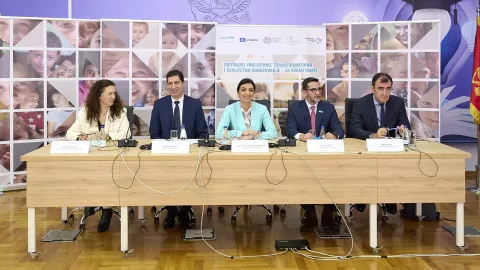We will support the overcoming of the challenges in education during the covid-19 pandemic
UNICEF Montenegro Representative, Juan Santander, met with children, teachers and parents to discuss the challenges they face in the organization of a quality, inclusive teaching process

- Available in:
- Crnogorski
- English
- Shqip
PODGORICA, 4 NOVEMBER 2020 – The beginning of the new school year brought many challenges to schools, teachers, children and parents, who had to adapt to the new method of teaching and learning in the conditions imposed by the COVID-19 pandemic. Under the new circumstances, the quality and inclusion of education are at stake and many children are at an increased risk of being left behind.
To become more familiar with the key challenges faced by schools, teachers, parents and children during the COVID-19 pandemic, UNICEF Montenegro’s Representative, Juan Santander, visited Savo Pejanovic Elementary School today.

In order to understand how to support children, schools and parents during the COVID-19 pandemic, we want to hear from children and parents directly about the concerns they have, the challenges they face, but also how they think these issues can be solved. Only through such discussions and consultations can we get to know about the real needs of children, parents and teachers, and UNICEF will make an effort to support the institutions of the system to respond to these needs, so that every child has access to quality, safe and inclusive education.
The UNICEF Montenegro representative talked to second- and sixth-grade students, and the students said that it was important for them to go to school both for easier learning and for spending time with other children.
I was looking forward to going back to school because I missed my friends and I missed sitting at my desk, and not waiting for the teacher at home to tell us what we should do.


Online teaching is much more difficult. It is easier for us to understand in this way when we come to school, because in this way, when something is not clear to us, we can ask, we can go up to the board to complete tasks.
Representatives of Savo Pejanovic Elementary School pointed out that careful planning of classes is one of the key solutions for organizing a quality, inclusive teaching process that takes into account the needs of children from the most vulnerable groups.
The successful organization of teaching is based on careful planning and full understanding of the content of the relevant subjects and needs of the students.


It was important to align the teaching process and return to school with the current characteristics and capacities of children with special educational needs.
Our school is also attended by a large number of Roma and Egyptian children, and we are trying to include them in the educational process, as well as other children, in the conditions of the COVID-19 pandemic. In addition to helping them to master the material, the goal of our work with them is to promote the values that education brings.

The parent Miloš Novović, whose child attends the eighth grade of elementary school, emphasized the importance of direct contact of children with teachers and other students, as well as that more frequent stay of children in school would give better results than exclusively following classes online.

My only comment is that all students who are following lessons from home must attend consultations, which will contribute a lot to them mastering the material. Also, in those few meetings they have with friends every 15 days, they fulfil that social need, which is direct contact.
UNICEF, together with the EU, has previously advocated that safe and quality child-friendly education during a pandemic, with a focus on the needs of the most vulnerable, should be a priority of the government and the whole society. UNICEF has also advocated for decisions on school reopening and modalities of work of each school to be made in cooperation with health professionals, the school management and staff, parents, students and the local community.
A survey conducted in September by Ipsos, with the support of UNICEF and the British Embassy in Podgorica, on a nationally representative sample of parents of school-age children showed that most parents think that, in the long run, distance learning can lead to a decline in children's motivation to learn. They also point out that children miss socializing with their peers and that many parents cannot provide adequate support for their children in learning.
UNICEF will continue to advocate for all institutions of the system to provide support to schools, students and families in overcoming the challenges they face during the organization of classes during the COVID-19 pandemic.




